Peasant-Scribe Disparity
Data collection practices haven't changed for thousands of years. Do they meet the modern needs?
On this page
The Story of Peasant and Scribe
Ancient Egypt. A peasant comes to a warehouse with a sack of wheat grain. He is greeted by a scribe who asks a simple question:
– What’s your name and how much grain have you brought here today?
– My name is Djal and I brought one sack of wheat grain.
The scribe writes the name and the amount on his papyrus.
– Thank you. Put the sack over there and leave. See you next year.
The end.

(Tomb painting of a scribe tallying the wheat harvest from Tomb of Menna, 18th Dynasty)
This story describes a typical scenario of data collection that hasn’t changed much in the last five thousand years. It has two distinct roles: data subject and data collector (the one who doesn’t have a papyrus and the one who does). The biggest changes since ancient Egyptian times is in the data storage medium that evolved from papyrus to paper, eventually to a mainframe and a PC, and finally moved into the cloud.
The peasant-and-scribe scenario contains a fundamental disparity between parties, where data collector has virtually unlimited access to all the data, while data subject can access the data only occasionally, if ever. Modern examples include bank customers and banks, internet users and search engines, social networks, online shops, etc.
This scenario doesn’t fit modern data management needs. The majority of modern data exchange participants act simultaneously as data collectors, data subjects and, most importantly, data producers. The disparity needs to end, with all the parties receiving equitable data rights and data stewardship capabilities.
MetaLocker offers a way to make it happen.